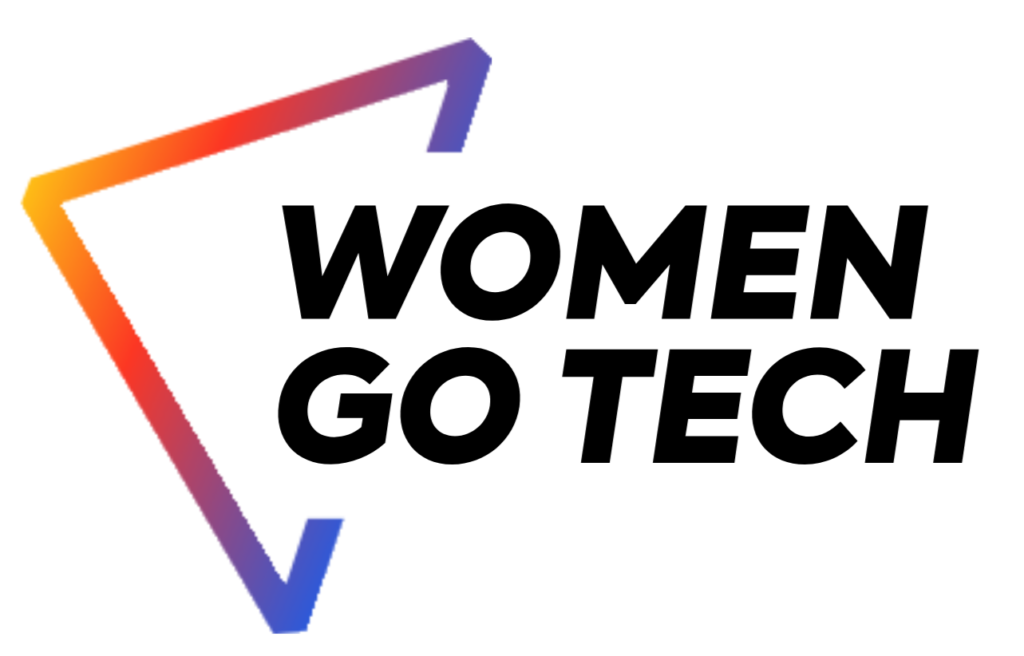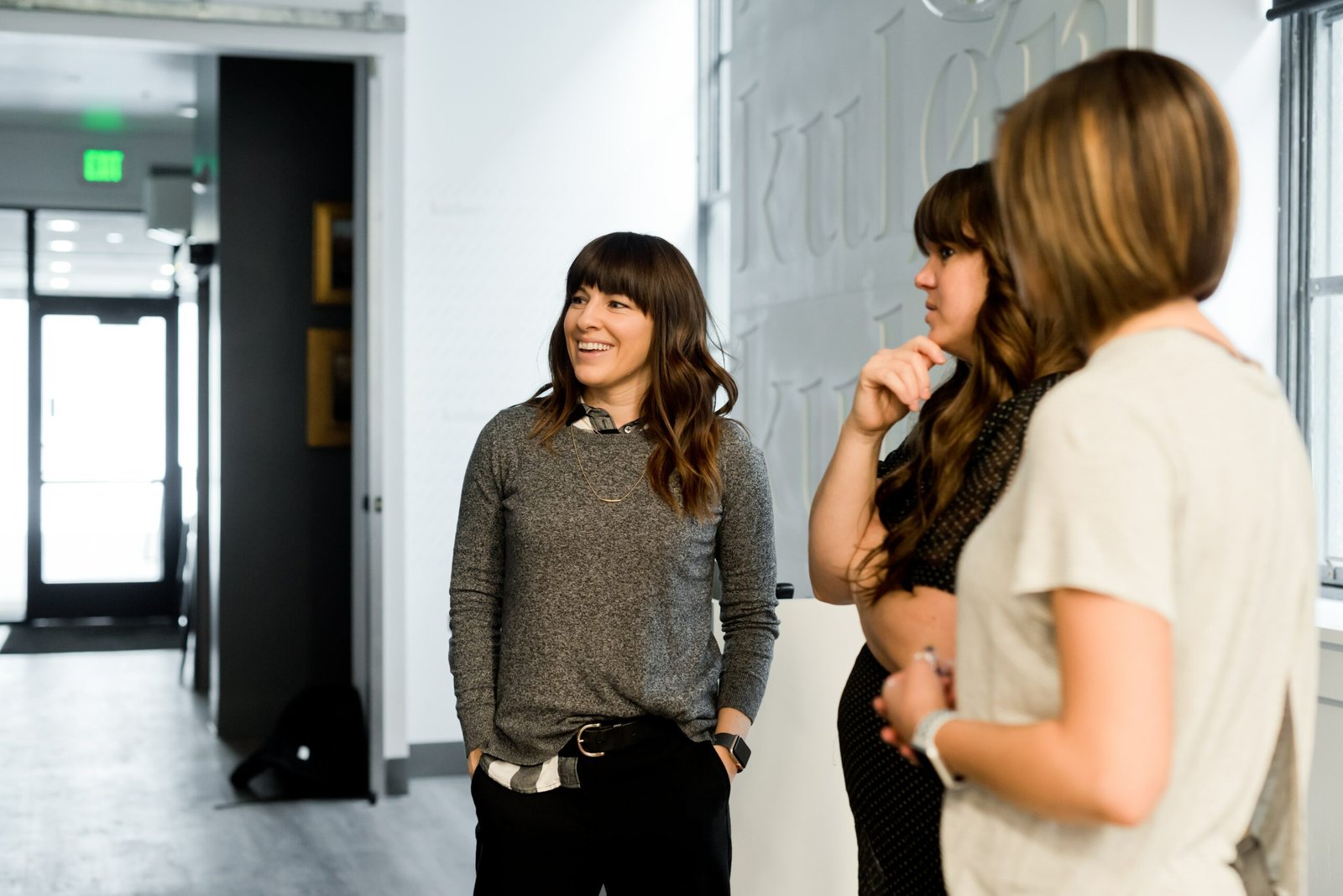
Mentors & Experts
Mentoring is best described as an educational process when mentors share knowledge with the purpose of surfacing potential in their protégés.
Filter by Category
-

Today, we’re excited to introduce you to Modesta Jeremičienė, a tech professional with over 13 years of experience in IT and a Women Go Tech IT Project management mentor. Starting […]
Today, we’re excited to introduce you to Modesta Jeremičienė, a tech professional with over 13 years of experience in IT and a Women Go Tech IT Project management mentor. Starting as a full-stack developer, Modesta’s career naturally evolved into leadership roles, leading her to her current position as Development Manager at Visma, where she manages a team across Lithuania and Norway.
Modesta is passionate about sharing her expertise and helping others grow in their tech journeys. In this interview, she reflects on her career milestones, her approach to project management, and the rewarding experience of mentoring aspiring tech professionals.
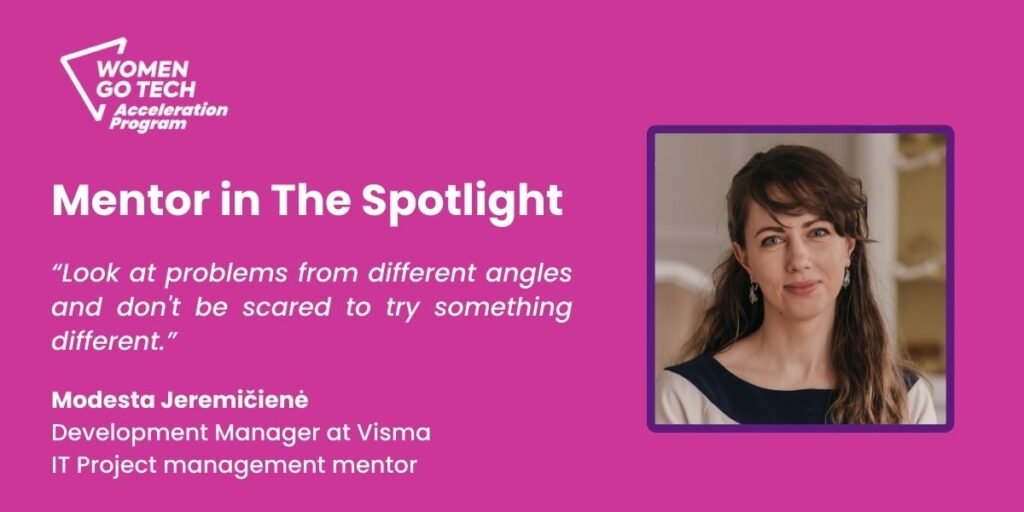
Can you introduce yourself and share a bit about your background in IT project management?
I’m Modesta, I worked as a full-stack developer for 13 years. During that time, it was 6 years with mixed responsibilities – developer, personal manager and team lead. Since then, I’ve been a full-time manager for more than 30 people in Lithuania and Norway.
What initially sparked your interest in pursuing a career in tech and project management?
My initial interest was development 🙂 but after a lot of years in it, I naturally drifted in a management position. My current position wasn’t the goal of my career, but it was a natural path with my skill set.
What moments or roles have shaped your career the most?
- The first moment was my decision to study information technology after school.
- The second moment was a perfect internship at my first company (I got a job offer after 2 months of internship).
- Third moment – Visma. Management in Visma saw my potential and gave me a lot of challenges – PO in an internship, internship coordinator, personal manager (coach), team lead and finally, manager’s position.
What do you find most rewarding and challenging about working as a Development Manager at Visma?
The development manager position is still pretty new for me, so the most challenging thing is to figure out what I need and I can do. I have experience in management, but the scope of development manager is much bigger.
The most rewarding things are trust and respect from colleagues.
What are some of the latest trends or tools in IT project management that you find exciting or promising?
It’s hard to say what the trends are because we are a huge company and most of the tools are part of the Visma group. Personally, for me, Lucid tool was a break dealer for showing different things in a graphical way. The Second most useful tool is Google Spreadsheets 🙂 And for sure Slack 🙂
Do you prefer particular methodologies, and why?
Agile. In today’s world you must be fast. Agile enables us to do that.
Project management is a popular field in tech. What three skills do you think aspiring project managers should focus on developing?
- Communication – you must work with different people and collaborate with them. Without good communication your work will be much harder.
- Open-minded mindset – sometimes you must think outside the box and agree with different opinions, consider them and adapt.
- Delegation – you can’t do everything by yourself.
For someone already in a project management role, what advice would you give to help them progress to a senior or leadership position?
I’m not in such a position yet, but if I could, I would say – stay curious about people, processes, tools, and everything around you.
Are there any courses, books, podcasts, or other resources that have made a difference in your career development?
- Camille Fournier. The Manager’s Path: A Guide for Tech Leaders Navigating Growth and Change
- Henry Cloud,John Townsend. Boundaries: When to Say Yes, How to Say No to Take Control of Your Life
You’re currently a mentor. What inspired you to take on this role, and what has been the most fulfilling aspect of mentoring?
I was looking for what else I could do in my life, and Woman Go Tech came at the right time.
During mentoring, I finally understood that I have a lot of experience from different fields, and I just love to share that. The most important thing is that I was able to connect and help two amazing women.
Can you share a highlight from your mentoring experience where you saw your mentee make significant progress?
Curiosity – look at problems from different angles and don’t be scared to try something different.
What advice would you give to others who are considering becoming mentors?
Do it 🙂 If you won’t try you won’t know if it is for you.
What qualities do you think are important for mentors to bring to their relationships with mentees?
- Punctuality
- Responsibility
- Consistency
How have you navigated challenges unique to women in the tech field, and what advice do you have for others facing similar situations?
I can’t remember any challenges in the IT industry just because I’m a woman. If you are doing your job well it doesn’t matter the gender. Main advice from me – don’t give a shit and try to be the best version of yourself.
-

Meet Laura Vaščegė, a Product Manager and mentor with Women Go Tech, who made a bold pivot into the tech industry after a career in leadership. Transitioning into IT without […]
Meet Laura Vaščegė, a Product Manager and mentor with Women Go Tech, who made a bold pivot into the tech industry after a career in leadership. Transitioning into IT without a traditional tech background was one of her biggest challenges, requiring her to step out of her comfort zone, constantly learn, and embrace the feeling of starting from scratch.
Through patience, persistence, and mentorship, Laura not only found her footing but discovered a passion for blending strategic thinking with hands-on product delivery.
In this conversation, Laura shares her journey of growth and resilience, offering insights on navigating career transitions, empowering women in tech, and trusting the process of steady, incremental progress.

Can you briefly introduce yourself and share your background in the tech industry? What sparked your interest in pursuing this career path?
I’ve spent most of my career in leadership roles, but I wanted to add a new dimension to my skillset. IT had always interested me, and product ownership felt like the right challenge. It’s been a great way to combine my team leadership experience with the process of delivering successful products. This blend of strategic oversight and hands-on delivery has been both exciting and rewarding.
You’ve managed teams in various capacities, from Team Lead roles to your current position as Product Manager. How has your leadership style evolved across these different roles and industries?
My leadership style has definitely evolved. Early on, it was more about just getting the job done, but now, I focus more on building a collaborative and engaged team. Whether it’s in a volunteer setting or managing product teams, I’ve learned that fostering open communication, creating clear goals, and empowering people are key to success. It’s about making sure the team feels supported and trusted to do their best work.
Have you encountered any significant challenges or obstacles in your own career? How did you overcome them?
One of my biggest challenges was transitioning into IT. I didn’t have a traditional tech background, and that first year was tough—stepping out of my comfort zone, constantly learning, and feeling like I was behind. But I stayed patient, kept pushing myself, and sought out mentorship, which made all the difference. It’s worth mentioning I still have a lots of room to grow, but now, I trust the process and have learned to be okay with steady, incremental progress.
This year you became a mentor with Women Go Tech. What inspired you to take on this role, and what do you find most rewarding about mentoring other women aspiring to join tech industry?
Mentorship has always been a crucial part of my career, helping me navigate challenges and grow professionally. I know firsthand how overwhelming it can be to break into tech. When I had the opportunity to become a mentor with Women Go Tech, I was excited to join such an outstanding community dedicated to empowering women in tech. It’s incredibly rewarding to support others on their journeys, watch their confidence grow, and know that I’m playing a part in shaping their paths in this dynamic industry.
Based on your experience, what are the most common obstacles women face when transitioning into tech roles, and how do you guide them through these challenges?
Women often face multiple layers of challenges in tech, starting with societal stigmas about what roles are “suitable” for them. Working in a male-dominated field can amplify feelings of isolation or imposter syndrome. There’s also the challenge of lacking the same level of encouragement or support from family or peers, which men often receive. I guide mentees through this by fostering confidence, encouraging them to build strong networks, and helping them find communities that can offer both emotional support and career guidance. Overcoming these obstacles starts with small victories—believing in your skills, asking for opportunities, and not being afraid to advocate for yourself in male-dominated environments. Building resilience and trusting that your voice matters in shaping the future of tech is key.
Given your own career pivot into IT, what advice would you offer to professionals considering a similar transition?
For anyone considering a pivot into IT, my advice is to be patient and not rush the process. Use online resources, get hands-on experience, and find a mentor to guide you. But don’t blindly follow industry trends. Take the time to research what truly interests you and aligns with your expectations for work content and culture. Stay curious and keep learning, and remember that the right fit is more important than chasing the latest buzzword job.
How do you approach personal development and continuous learning in your career, and how do you keep up with changes in the field?
I’m always looking for ways to grow, whether it’s through attending webinars, taking courses, or learning from my peers. I try to stay current with trends and make time for reflection to see where I can improve. For me, continuous learning is not just about hard skills but also about evolving as a leader and communicator.
Can you share a recent book, podcast, or resource that has positively impacted your professional growth?
Recently, I’ve been really inspired by “The Lean Product Playbook” by Dan Olsen. It’s a great resource for product managers or anyone looking to create customer-centric products. It reinforced a lot of principles I already believe in, especially the importance of iterating quickly based on feedback.
-
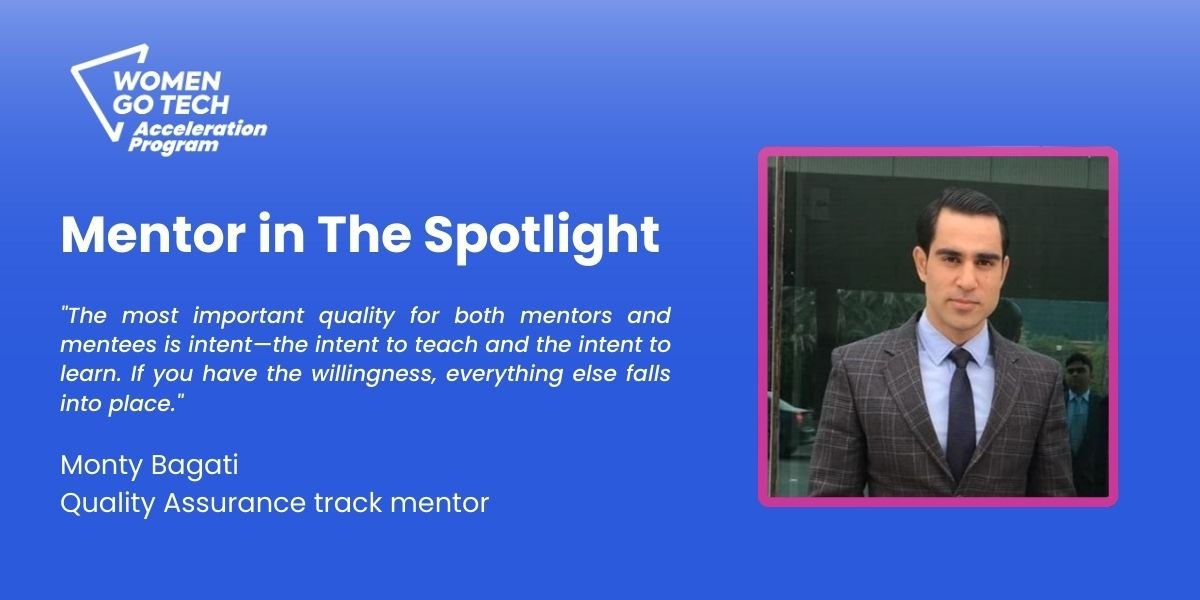
We’re excited to continue our mentor series with a new conversation. This time, we’re talking to Monty Bagati, a QA professional with over 16 years of experience spanning the Middle […]
We’re excited to continue our mentor series with a new conversation. This time, we’re talking to Monty Bagati, a QA professional with over 16 years of experience spanning the Middle East, Europe, and Asia. Monty’s diverse background in quality assurance, gained through his work with various clients across numerous sectors, offers valuable insights into the evolving field of software testing.
In this conversation Monty shares his journey, approaches to problem-solving, and perspectives on emerging technologies like AI in quality engineering.
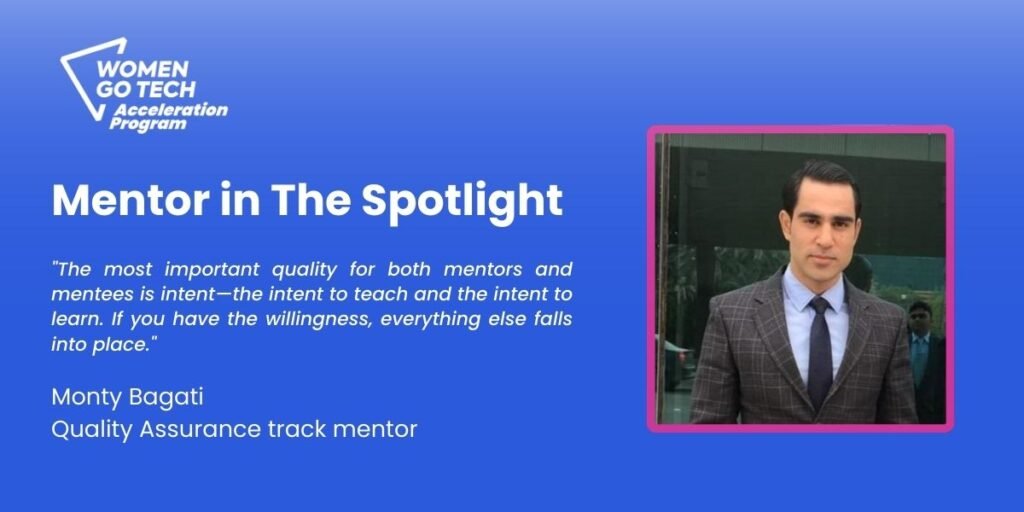
You started your career at IBM as a Manual Tester. What sparked your interest in testing, and how did this shape your career?
My career began during my third year of engineering in India. Although I was studying mechanical engineering, IBM recruited me through campus placements. They placed me in testing projects, so while I didn’t choose testing initially, it chose me.
I’ve had the privilege of working in numerous domains due to my role in a service company, which differs from product companies. In a product company, like a bank, you typically focus on developing specific products within that industry, shaping your career around that niche.
However, in a service company, I’ve had the opportunity to collaborate with a diverse range of clients across different sectors like telecommunications, logistics, finance, banking, media and entertainment. I gained diverse experience, especially in quality testing, and that’s how my journey in testing evolved.
You transitioned from mechanical engineering to testing. What resources helped you navigate this change?
Back in 2008, resources and mentorship weren’t as accessible as they are today. I had to rely on company-provided training and guidance from experienced colleagues. Unlike now, where there are abundant online resources, I learned by doing—making mistakes and ensuring I didn’t repeat them. It was a hands-on learning experience that gradually built my expertise in testing.
As someone who’s now a manager and mentor, how do you guide juniors who want to requalify or advance in their careers?
When someone approaches me, I first ask what they want to achieve. I tailor my guidance based on their goals, whether they’re complete beginners or have some experience. For example, I’m currently mentoring three people who wanted to learn quality assurance from scratch.
I created a structured plan that not only teaches them the basics but also prepares them for potential job interviews. My approach is to break down complex topics into manageable goals, ensuring they have a solid understanding by the end of the mentorship.
Problem-solving is key in any field. How do you approach it, and can you share an example from your career?
My approach to problem-solving is straightforward: clearly identify the problem, create a well-defined problem statement, and ensure it’s understandable to everyone involved. Once the problem is clear, we analyze it, identify the challenges, and then apply the appropriate solutions. The key is to make sure everyone is on the same page before moving forward with implementation.
The tech field evolves quickly. How do you stay updated, and do you have any recommendations?
I stay active on LinkedIn, following groups related to testing and keeping up with the latest trends. Mentoring also forces me to stay updated since I need to be prepared to answer any questions my mentees might have. Additionally, I participate in conferences, webinars, and serve as a beta tester for automation tools, which keeps me on my toes. These activities help me stay connected with the latest developments in the tech stack.
Are there any emerging trends in quality engineering and automation that excite you?
Yes, the integration of AI into quality engineering is really exciting. Many companies are incorporating AI features into their automation tools, allowing for test cases to be created without writing code. This AI integration is something I’m passionate about and follow closely. It’s evolving rapidly and has the potential to significantly change how we approach quality assurance.
AI tools are helpful, especially for beginners. But do you think there are risks involved? Can AI be trusted in quality assurance?
AI can definitely be trusted for tasks like writing simple code or debugging. It’s efficient and pulls information from online resources, similar to how we used to search on Google. However, we should be mindful of its limitations, especially when handling sensitive material. AI is a powerful tool that reduces time on routine tasks, but it’s important to use it wisely. Whether AI will fully replace human roles is uncertain, and we’ll have to wait and see its full impact in the coming years.
You’re currently a mentor with Women Go Tech and have been involved in other mentoring programs in the past. What qualities make an effective mentor, and how do you ensure you’re providing the best help to your mentees?
The most important quality for both mentors and mentees is intent—the intent to teach and the intent to learn. If you have the willingness, everything else falls into place. For me, I have a clear intent to teach, and I’m determined to make it work. For example, I dedicate 30 minutes, three times a week, to mentoring.
Even when conflicting meetings arise, we coordinate and reschedule if needed. Effective mentoring requires active engagement, understanding your mentees’ needs, and making time for them.
Mentorship involves helping mentees navigate challenges. What recurring challenges do you see, and how do you help them overcome these obstacles?
Aside from willingness and intent, the biggest challenge is discipline. Many mentees start with enthusiasm but tend to drop out when they face difficulties or lose interest. Education and learning require consistent effort, and without discipline, it’s easy to give up. My role as a mentor is to help them recognize this and encourage them to stay disciplined and persistent in their learning journey.
As a busy professional, how do you balance mentorship with your other responsibilities? Any tips for aspiring mentors?
Everyone has their own routine, but if you want to give back to the community, learn, and network, I’d recommend applying for mentorship programs, hosting meetups, or doing webinars. Mentoring isn’t just about teaching, it’s also about learning. Before you can effectively teach others, you need to be well-prepared yourself. While it might seem challenging to juggle both, the rewards of mentoring – in terms of personal growth and networking – make it well worth the effort.
Find more mentor stories here.
-

Meet Inga, a seasoned product owner and product ownership mentor here at Women Go Tech, blending business acumen with technical expertise. With over 15 years in industries like Sales, Telecommunications, […]
Meet Inga, a seasoned product owner and product ownership mentor here at Women Go Tech, blending business acumen with technical expertise. With over 15 years in industries like Sales, Telecommunications, Logistics, and Banking, she’s guided teams through a wide range of complex projects.
Her journey began at Kaunas University of Technology, where she developed a deep understanding of systems and processes, which naturally led her to the world of product ownership. Today, as a Senior Business & Systems Analyst at Accenture, Inga excels at bridging business needs with technical solutions. We’re excited to have her share insights about her career, mentorship, and more with you today.

Can you briefly introduce yourself and share how your professional journey has evolved from your studies to your current role?
An ambitious, goal-oriented person with 15+ years of versatile experience in Sales, Telecommunications, Logistics, and Banking.
After finishing school, I started my bachelor’s in Computer Science at Kaunas University of Technology. Later, I pursued two master’s degrees—one in Enterprise and Organizational Systems, and another in Human Resources Management. During my studies, I worked in various positions in sales and purchasing, which shaped my understanding of business processes and operations.
You transitioned from a sales and purchase background into tech. What motivated this career change, and how did you navigate the shift?
What motivated me was the desire for more analytical work and a closer connection to systems that support business operations. One of my friends, who was a mentor in the Women Go Tech Acceleration Program, recommended it to me. He warned me about the strict selection process, but I was fortunate to be selected, which provided me with invaluable insights, lectures, workshops, and much more.
Transitioning from sales and purchasing to a Business Analyst (BA) role was fairly smooth since both careers focus on understanding business processes and optimizing operations. Many skills I developed were directly transferable.
- Communication: Essential for gathering requirements and explaining findings.
- Negotiation & Relationship Building: Useful for managing stakeholders and aligning project goals.
- Problem-Solving: A critical skill for identifying inefficiencies and suggesting solutions.
- Analytical Mindset: Crucial in both roles for analyzing data and driving insights.
I also had to upskill in areas like:
- Requirements Gathering: Learning new techniques such as BRDs (Business Requirements Documents) and user stories in Agile.
- Project Management: Gaining basic knowledge in Agile and Scrum.
- Process Modeling: Learning how to map business processes using various tools.
Relevant certifications helped me bridge the gap.
What are your key responsibilities as a Senior Business & Systems Analyst at Accenture, and what challenges do you face?
In my current role, I’m responsible for bridging business needs with technology solutions. A large part of my job is gathering requirements from stakeholders through interviews, workshops, and surveys. I then translate these into technical language for development teams.
Other key tasks include:
- Analyzing business processes: Identifying inefficiencies and designing workflows for optimization.
- Collaborating with solution architects and developers: Ensuring system designs meet scalability, security, and performance needs.
- Testing & Quality Assurance: Creating test cases and working closely with QA teams during user acceptance testing.
- Change Management: Helping organizations with training materials and smooth transitions during system go-lives.
Some challenges include:
- Changing requirements: Stakeholders often change their minds, which can throw off timelines. Defining a clear scope and strong change management is crucial.
- Balancing business and technical needs: I act as a mediator to align business value with technical constraints.
- System integration: Especially with legacy systems, where compatibility can be a challenge.
- Managing stakeholder expectations: Transparency and realistic timelines help maintain trust.
To ensure successful project delivery, I focus on clear communication, iterative development (Agile), early risk identification, and thorough documentation using tools like JIRA and Confluence.
You were a mentee in the Women Go Tech program before becoming a mentor. What were your key takeaways as a mentee, and how did they impact your career?
Being a mentee in Women Go Tech was transformative. The key lessons I learned were:
- Confidence: Having a voice in meetings and promoting your ideas is crucial, especially in tech.
- Networking: Building genuine connections is invaluable for learning and sharing knowledge.
- Continuous Learning: The program encouraged me to keep expanding my skill set, which I now prioritize in my career.
These lessons accelerated my growth, and now, as a mentor, I pass them on to others.
What inspired you to become a mentor, and how do you guide others?
I was inspired by the impact my own mentor had on my career. The guidance and encouragement I received boosted my confidence, and I wanted to offer the same support to others.
As a mentor, I help mentees find their confidence, step out of their comfort zones, and embrace challenges. I also emphasize the importance of networking and personal development alongside technical skills. My goal is to help mentees realize their potential and shape their careers with purpose.
What skills are essential for someone transitioning into tech, and how do you support mentees in developing them?
Key skills for transitioning into tech from a non-tech background include:
- Adaptability: The tech world evolves rapidly, so the ability to learn new tools and frameworks is crucial.
- Problem-solving: Breaking down problems and finding solutions is a transferable skill from many non-tech roles.
- Curiosity: A strong drive to understand how things work helps build expertise.
I create personalized learning plans for my mentees, offer relevant resources, and focus on building their confidence by highlighting how their previous experiences can be leveraged in tech.
How do you stay updated with tech trends, and how do you incorporate this knowledge into mentoring?
I make it a daily habit to stay updated by following industry blogs, podcasts, webinars, and books. I bring this knowledge into my mentoring by offering relevant, real-world examples and helping mentees see how these trends can impact their work and the industry as a whole.
Can you share a book, podcast, or resource that has positively impacted your growth?
Recently, I read Atomic Habits by James Clear, which had a significant impact on both my personal and professional life. The principles of building small, consistent habits resonated with me, especially in the fast-paced tech world. I’ve applied this mindset to my work and mentoring, encouraging my mentees to build small habits for long-term success.
Find more mentor stories here.
-
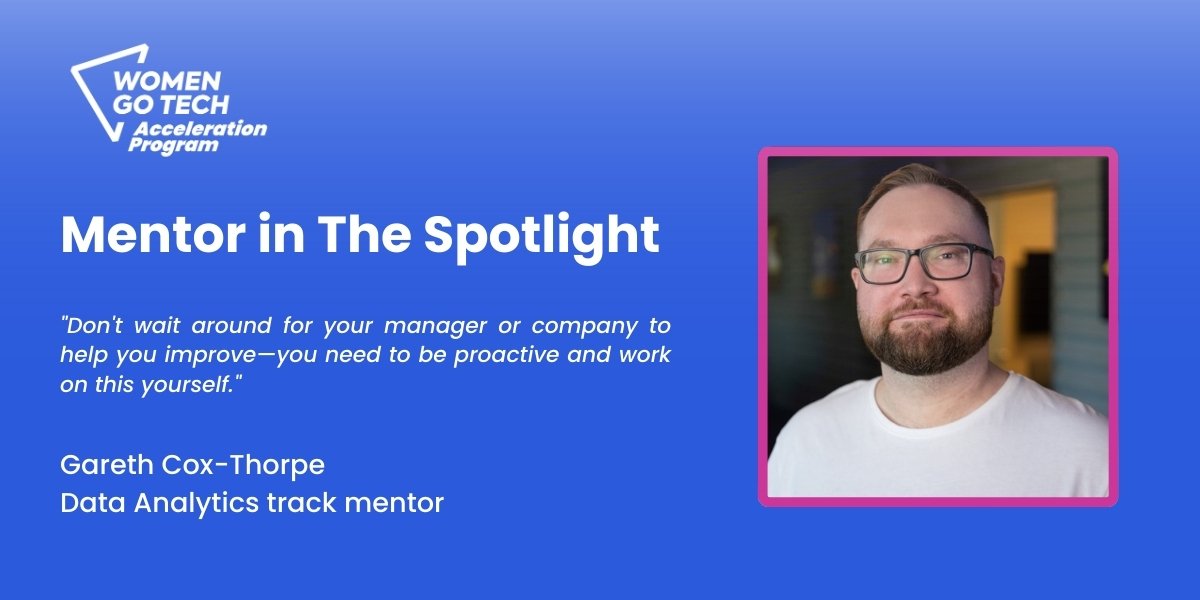
In this interview, we’re speaking with Gareth, a data analyst with 10 years of experience in the tech industry. Originally from the UK, Gareth’s journey into data began unexpectedly, driven […]
In this interview, we’re speaking with Gareth, a data analyst with 10 years of experience in the tech industry. Originally from the UK, Gareth’s journey into data began unexpectedly, driven by curiosity and a hands-on approach. Now based in Lithuania, he works as a Senior Sales Data Analyst at NordPass, part of Nord Security, a leading cybersecurity solutions provider.
Gareth discusses his career path, the challenges he’s overcome, and his passion for mentoring, offering a unique perspective on the evolving world of data analytics.

Can you briefly introduce yourself and share your background in the tech industry? What sparked your interest in pursuing this career path?
I’m originally from the UK but moved to Lithuania with my wife and cat at the end of 2021. I’ve been working in data for 10 years, which is crazy to realize how fast time has gone!
I would say my journey into working with data wasn’t as deliberate as most. I was working as a tracer for a debt purchasing company, and a few of my colleagues were using SAS within their jobs. I found it fascinating to see how they could write a script and easily manipulate data. So I started playing around with Excel, which led me to create a team tracker for the tracing team. Around this time, I also remember buying an Excel 2010 for Dummies book, but after reading a few pages while on the train, I never picked it up again. I’ve always found the best way to learn is to get on with it, make mistakes, and then learn how to fix them!
I then moved into a Junior Analyst position at a different company and discovered SQL, Qlikview, and Tableau. This is where I really found my passion, as I loved creating data products that delivered value for the whole company, such as understanding buying patterns and retention rates. After a couple of years, I moved on to my last role in the UK, which involved working with customer experience data. I was analyzing feedback from insurance customers and using this data to improve customer journeys and conversion rates.
And then the world got turned upside down with the pandemic, and my wife and I decided that we wanted to try and live somewhere else. With my wife being Lithuanian, Vilnius seemed like a good option, so here I am working as a Senior Sales Data Analyst for NordPass. Nord Security in general is quite different from my previous UK company. It’s a younger, more agile start-up, which creates more excitement but also more challenges, and it’s where I discovered a desire for mentoring and Women Go Tech.
Have you encountered any significant challenges or obstacles in your career? How did you overcome them?
This is an easy one for me. Moving to Lithuania and working in a different culture has been the biggest challenge. I remember when I first started and got quite a big shock due to me not knowing the language. Obviously, all of the company communication is in English, but the small chats in the kitchen that I couldn’t initially get involved with were a strange experience. However, this has also been the reason why my Lithuanian has improved since moving over here.
You’re currently working as a Senior Data Analyst at Nord Security. Can you tell us more about your role and what aspects of it you find most exciting?
My role at Nord Security is to analyze the B2B data of NordPass. I’ve recently been leading a project to rebuild the B2B data, which has included working with our data engineer on the backend data tables and then rebuilding the company-wide dashboards. I’m now wanting the whole data team to start using this data to provide insights to the different teams of NordPass. Insight delivery is very important, and I think a good analyst provides answers that haven’t been asked yet.
Are there any new trends, tools, technologies, or methodologies in the data analytics field that you find particularly promising or exciting?
I’m guessing you’re going to hear this answer a lot, but AI is the biggest thing at the moment. Even just using ChatGPT to correct or optimize your code is going to speed up analytical work so much. As analysts, I don’t think we should fear AI, I believe we should be using it to enhance our jobs.
The competition for entry-level positions in data analysis is quite intense nowadays. What are the top three skills that aspiring data analysts should develop to stand out in this field?
- Persistence—don’t just think, “It can’t be done.” Instead, have the attitude that there’s always a way.
- SQL—get good with this. A lot of smaller data teams probably won’t have a data engineer, so if you’re an analyst, you’ll also be expected to do backend work.
- Presentation skills—a lot of data people tend to be more introverted and don’t like doing presentations. If you get good at giving presentations, you’ll definitely stand out.
Do you have any advice for someone already working in this field who is looking to progress to a senior role? What helped you make this move?
Mentoring has helped me a lot, and I think as a senior, your responsibilities should include helping more junior analysts improve. You also need to develop confidence in your experience and skills, without it, you won’t be able to offer your advice to the company you work for.
How do you approach personal development and continuous learning in your career, and how do you keep up with changes in the field?
Don’t wait around for your manager or company to help you improve—you need to be proactive and work on this yourself. I’ve used Udemy or Coursera courses, and I also put myself on this Women Go Tech mentoring programme. Doing these things myself is how I’ve developed throughout my career. Also, when you’ve completed a course, shout about it on social media so people can see!
Can you share a recent book, podcast, or resource that has positively impacted your professional growth?
There’s two people that I follow that come to mind. One is Gary Vaynerchuk, he’s an entrepreneur who specializes in marketing. He often creates content around digital marketing but also more generic things such as what to do if you don’t know what you want to do in your career. The other person is Jesse Itzler, I actually found Jesse as he was a guest on Gary V’s podcast. He’s a guy that wants to do it all! He’s founded many successful companies but also overcome some huge personal challenges such as running a 100 mile race in 24 hours!
Why did you decide to become a mentor?
I’ve always liked giving advice and love helping junior analysts with their work so thought I would increase the opportunity to do this.
You’re currently mentoring two mentees. Can you share some highlights of your mentoring experience with them?
My mentees are at different stages of their career. Vitalija is not afraid of putting herself out there. She’s doing podcasts and talks at conferences. So the highlights from my time working with her is when she’s sharing one of her talks and then working on her content together. Julija has made a complete career change so she’s earlier in her analytical career. She’s currently studying with Turing College. My highlight with her is seeing how passionate she is when presenting her dashboard work to me which she got top marks for!
Finally, what advice can you give to other mentors?
I feel like I’ve learnt as much as my mentees, so my advice to other mentors would be to also be open to learning during the programme.
Curious to learn about the experiences of Gareth’s mentees? Read Julija’s and Vitalija’s stories here and here.
-
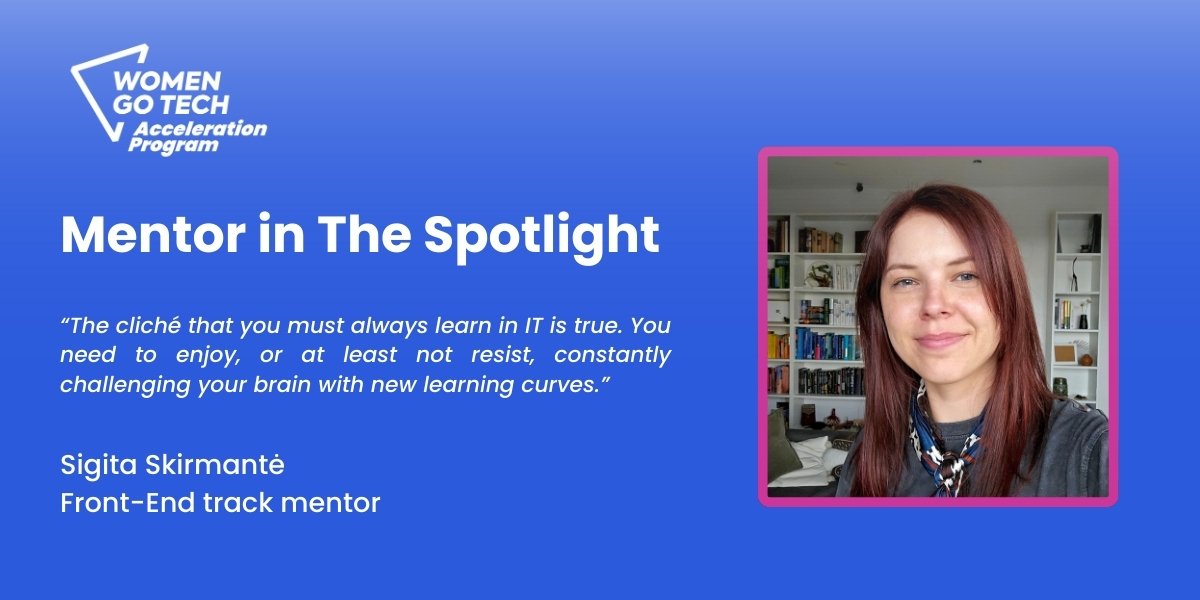
Today, we’re excited to introduce Sigita Skirmantė, a passionate front-end engineer at Devbridge and a dedicated mentor. With her own recent journey into IT, Sigita deeply understands the challenges and […]
Today, we’re excited to introduce Sigita Skirmantė, a passionate front-end engineer at Devbridge and a dedicated mentor. With her own recent journey into IT, Sigita deeply understands the challenges and triumphs of starting from scratch in this fast-paced field.
Having been mentored herself, she’s committed to giving back to the community by guiding and supporting aspiring developers. In this interview, Sigita shares her insights on mentoring, advice for those starting out, and the essential qualities for front-end engineers.
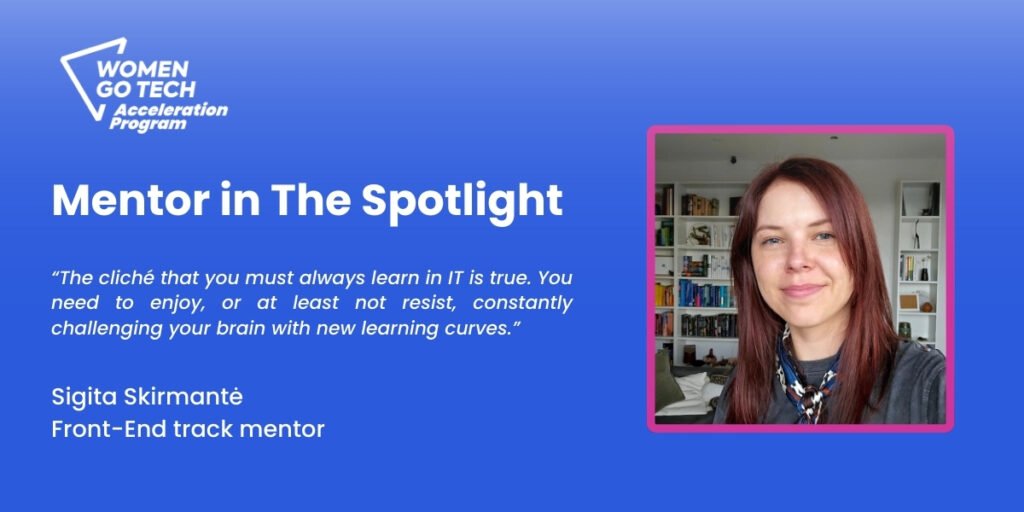
What drove you to become a mentor?
Having quite recently made the leap into IT myself (almost 4 years ago), I get the struggles of starting from scratch in a new field. I’ve been there, in the trenches of an entry-level position, trying to figure it all out. I know what it’s like to feel lost in a new field, trying to figure things out on your own.
But I also know the power of having someone in your corner, someone who can offer guidance and support.
I was fortunate to have a mentor who not only helped me identify areas for improvement but also believed in my abilities more than I did, convincing me I could land my first IT job. It’s definitely motivating when those close to you are supportive every day.
However, it’s even more impactful when a professional in the field you aspire to enter believes in you and assures you that you can succeed. His/her support significantly boosts self-esteem. I am grateful to my mentor Žygis up to this day. So, having been lucky myself, I want to give back to the community.
What advice would you give to those who are new to mentoring or are thinking of joining?
Seeing the struggles and triumphs of mentees, witnessing their journeys unfold, it’s incredibly rewarding. Being able to offer guidance and support to someone starting out in this field is incredibly fulfilling. So my advice would be – just start! If you’re already working in the field, you will definitely have some advice to share and technical gaps to help with.
Imposter syndrome is real for nearly every IT professional at some point in their career, including mentoring. In my experience, having those first meetings with your mentees can really help ease these feelings. Once you interact with them personally and get to know the people behind the profiles, you’ll feel a warm sense of connection and inspiration.
I believe that throughout it all, it is important to emphasize that it’s okay to struggle and ask for help. We’re all in this together, and the journey is just as important as the destination.
What do you hope to achieve in the Acceleration Program?
To be the mentor I had when I was starting out – someone who gets it, keeps it simple, and genuinely wants to see mentees succeed in this crazy world of tech. Hopefully, mentees will feel technically and emotionally more mature when entering the IT sector.
What is your one piece of advice for the mentees trying to land their first job?
The harsh truth is that many people today complete various programming courses, but a certificate alone doesn’t assure employers that aspiring developers have truly learned the material, are genuinely motivated, or that the course was of high quality.
My advice is to take extra steps to stand out. Demonstrate your dedication through GitHub activity beyond just course homework, attend IT events, enhance your LinkedIn profile with meaningful descriptions, host a webpage (even a simple one), and engage in any other activities that showcase your determination beyond the standard courses taken by others in the industry.
What characteristics do you believe are important for front-end engineers?
This is especially true for front-end developers, where attention to detail and a passion for UX and UI are crucial. Additionally, it’s important to honestly assess your willingness to learn continuously. The cliché that you must always learn in IT is true. You need to enjoy, or at least not resist, constantly challenging your brain with new learning curves.
You will likely never reach a point where you can say, “I feel completely confident and can stop researching.” Learning is a daily part of the job, from junior to senior levels.
Find more mentor stories here.
-

Ewelina Wiznerowicz, a product ownership mentor, has always found fulfillment in teaching and sharing her wealth of knowledge. Whether speaking at conferences, leading meetups, or giving guest lectures, Ewelina embraces […]
Ewelina Wiznerowicz, a product ownership mentor, has always found fulfillment in teaching and sharing her wealth of knowledge. Whether speaking at conferences, leading meetups, or giving guest lectures, Ewelina embraces every opportunity to inspire others. Today, Ewelina shares her insights into what makes a great mentor, the lessons she’s learned from mentoring, and what she hopes to achieve during her time in the Acceleration Program.

What drove you to become a mentor?
Since I’ve remembered, I loved teaching and sharing knowledge and experience. As often as I can, I participate as a speaker in various conferences and meetups. Whenever I have the opportunity, I give guest lectures. The fulfillment I get from seeing others grow and succeed is what keeps driving me to continue mentoring. There’s something special about being able to guide someone on their path and watch them achieve their goals.
What are the top three things you learned from mentoring or being a mentee?
- Everyone is driven by something – the key to success is to find what it is. Understanding what motivates each person is crucial to helping them unlock their potential.
- Be patient and understanding – you know only a small piece of someone’s life, and it’s not our role to judge but to help find a solution in the given situation. Empathy goes a long way in mentorship.
- You can learn from anyone – everyone has their own unique story, and if you really listen and enter the relationship with an open mind, you may learn some amazing things. Mentoring is a two-way street; it’s about growing together.
What was your favorite mentoring moment?
Don’t laugh, but I’m always happy when my mentees do their homework. I know it may sound weird, but knowing that someone spent their time doing stuff they didn’t have to makes me proud of our tandem. It’s a sign that they’re committed to their growth, and that makes all the difference. Seeing them take that initiative is incredibly rewarding.
What advice would you give to those who are new to mentoring?
Be open-minded and don’t have expectations. It’s true – we’re devoting our time so that someone else may learn something, but if you approach it by being curious about another person’s journey and dreams and the opportunity to learn, it will be beneficial for everyone. Mentoring is about guiding, not imposing your views. It’s important to remember that every mentee’s journey is unique.
What do you hope to achieve in the Acceleration Program?
It’s a great adventure and a valuable experience. I’m excited to be part of it and to continue learning alongside my mentees. The Acceleration Program offers a unique platform to connect with driven individuals, and I hope to help them navigate their paths while gaining new insights myself. For me, mentoring is about growth – both for the mentee and the mentor.
-

We’re thrilled to shine the spotlight on Julija Varneckienė, the Chief Operations Officer at CapitalBox and a Product Ownership track mentor. In this interview, Julija shares her journey into mentorship, […]
We’re thrilled to shine the spotlight on Julija Varneckienė, the Chief Operations Officer at CapitalBox and a Product Ownership track mentor.
In this interview, Julija shares her journey into mentorship, the valuable lessons she has learned along the way, and the profound impact of guiding others. With a rich background in system development and organizational change, Julija’s insights provide a thoughtful look at the essence of mentorship and its lasting rewards.

What drove you to become a mentor?
Throughout my career, I have been responsible for system development, training, and managing organizational changes toward automation and process implementation. These experiences have helped me guide people in their daily duties and manage personal changes effectively. When a former colleague saw a mentorship opportunity, she suggested I should give it a try, thinking it would be a great fit. So, I did. And here I am. ~15 mentees in 5 years.
What are the top three things you learned from mentoring?
1. Listen more, speak less. Through mentorship, you recognize that it’s not always about showing people the exact direction, but more about listening to where they want to go and supporting and encouraging them to take steps forward. Most people are very smart but often biased by uncertainty and underestimation of their own abilities.
2. People seeking mentorship aren’t always ready to be mentored. Some people view mentorship as a process where you do the work, and they just “attend.” It’s important to identify these individuals early and manage your time effectively.
3. The importance of continuous learning. Mentoring is a two-way street. While you guide and support others, you also learn a lot about yourself, your strengths, and areas for improvement. Mentoring helped me to become a better leader for my team and get additional knowledge.
What surprised you most, and what was your favorite mentorship moment?
The most surprising thing is realizing how just a few sessions can profoundly impact someone’s life. My favorite moments are seeing the joy on my mentees’ faces as they achieve their goals and witnessing them return after a few years seeking further guidance. It’s incredibly fulfilling to know that our time together has had a lasting effect.
What advice would you give to new mentors?
Set very clear expectations and be personal. It might take a few sessions to figure out mutual expectations and understandings, so take your time. Don’t be too theoretical; share your experiences, mistakes, drivers, and insights. People look for connection and real-life examples—things they can’t get from reading theoretical books alone.
Can you share a mentee success story, and how did it make you feel seeing that success?
My very first mentee approached me after taking some online coding school classes with a couple of questions: “What’s next?” and “Is this the right path?” We began by exploring and clarifying different possibilities in business and IT. We identified his strengths and areas of disinterest.
Then, we worked on a sample business case to provide practical guidelines and crystallize his areas of interest. Step by step, he delved deeper into the subject. After a few years, he is now the most valuable community leader in Lithuania for the platform I introduced him to. With a lot of passion and hard work, he transitioned from being a musician to an IT admin and developer, discovering his path and realizing the value he could create, all while enjoying the journey. I am incredibly proud of him. This transformation was 100% his effort to change his life.
Another story involves an incredibly talented woman who lost belief in her abilities after trying to return to work following maternity leave. After a few sessions, it was clear she was regaining her self-confidence and control. We identified her strongest skills, prepared for job interviews, and she landed a job. I felt incredibly proud of her. The most rewarding moment is seeing others achieve their goals. They did it all themselves; I just helped light the path for them and supported them through the journey.rd work and proactive attitude truly paid off. It’s so inspiring!
-

Jolita Jezukevičiūtė, Chapter Lead (Tech. Product Owner) at Danske Bank, Women Go Tech ambassador and a mentor in the IT Project Management track is making a significant impact in the […]
Jolita Jezukevičiūtė, Chapter Lead (Tech. Product Owner) at Danske Bank, Women Go Tech ambassador and a mentor in the IT Project Management track is making a significant impact in the tech industry. Beyond her professional achievements, she is deeply committed to mentoring and empowering others. We’re talking to Jolita about her journey as a mentor and the valuable lessons and rewarding experiences she has encountering along the way.
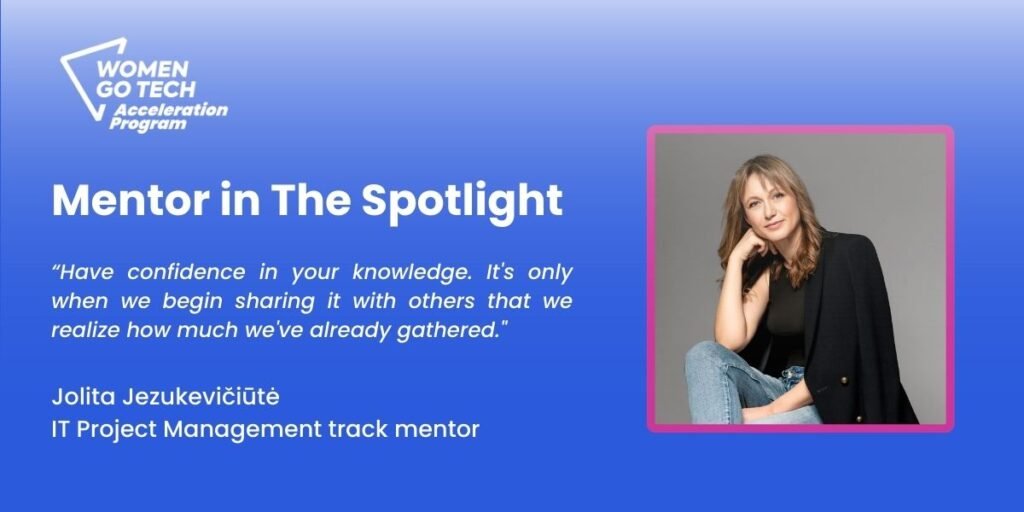
What drove you to become a mentor?
To be honest, I started looking for what would truly inspire me, and mentorship has always meant a lot to me. I was a mentor in previous companies and later in a UK IT program. It was natural for me to continue mentoring because it offers a chance to make someone’s life easier by guiding them into IT. Helping even one person is a huge achievement + you improve yourself along the way.
Last year, I saw on LinkedIn that Women Go Tech was looking for mentors for the Acceleration program, which also supported Ukrainian women. This attracted me even more, so I immediately applied. I love how this community grows with our mentees and constantly improves by seeking feedback. That’s how real trust is built, in my opinion.
What are the top three things you learned from mentoring?
Based on my WGT mentoring experience, I can highlight three key aspects:
- Listening: Mentoring has taught me to truly listen and understand my mentees. Our sessions are focused on them, creating an open and supportive environment where they can shine. During our sessions with mentees, I mostly listen to them and only interject when they have a question or if it is necessary to introduce a new topic. Also, our feedback sessions are actually pretty awesome!
- Quality: The importance of dedicating quality time to each mentee is critical. Last year, I had three mentees, but this year I limited myself to one to ensure I could provide the best support. It’s not about taking on as many mentees as possible, it’s about taking on as many as you can give quality time to. Rushing through meetings doesn’t do anyone any favors.
- Self-motivation: Sometimes, things don’t go as planned. I had a mentee who disappeared at the start of the program. It was disappointing, but I learned that you can’t force someone to be motivated. I reached out a couple of times, but when there was no response, I let it go. It’s important to understand that no one else is responsible for our happiness, motivation, and professional growth. We are responsible for that, and we can’t do the work for our mentees.
What surprised you most, and what was your favorite mentorship moment?
We’re all so different, and that’s what makes mentoring special. One size definitely doesn’t fit all. I thought it would be beneficial to start a project from scratch, combining theory with practice to make it more real-world.
The concept remained the same, but its implementation was very different. For instance, with one mentee, we focused only on theoretical discussions using tools like Miro, while with another, we jumped straight into hands-on practice by using Jira, User story mapping, and Roadmap.
Life has a funny way of surprising you, doesn’t it? It’s also a rewarding feeling to see your mentee progressing. It easily became my favorite part of mentoring.
What advice would you give to new mentors, and is there a mentorship myth you’d like to dispel?
Have confidence in your knowledge. It’s only when we begin sharing it with others that we realize how much we’ve already gathered. While some believe that mentorship is all about the mentor sharing knowledge with the mentee, it’s actually more like a fun exchange where both sides learn and grow together. It’s all about creating a cozy vibe and making teamwork feel as easy as a breeze.
Can you share a mentee success story, and how did it make you feel seeing that success?
Transitioning to a career isn’t easy. Saying goodbye to the past while building the way for a bright future can be tough. That transitional phase simply requires patience, learning, and faith in one’s choices.
I was pleasantly impressed by one of my mentee’s proactivity. She actively contributed by suggesting tasks and engaging in discussions on topics that interested her. I’m incredibly proud of the progress she made during the program. Prior to the program, she was unemployed. After completing it, she found a job at an IT company in Kyiv, Ukraine. Despite the challenging circumstances in the region, her hard work and proactive attitude truly paid off. It’s so inspiring!
-
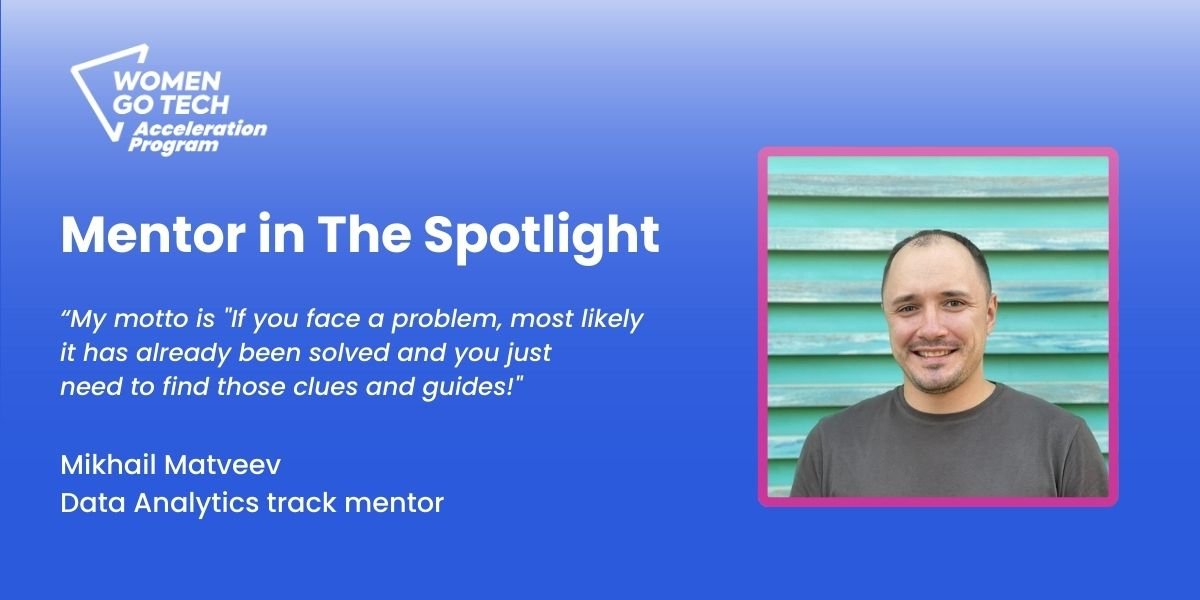
Mike Matveev, the CTO and CDO at B9, has been at the forefront of data analytics for over a decade, navigating the evolving tech landscape from a junior position to […]
Mike Matveev, the CTO and CDO at B9, has been at the forefront of data analytics for over a decade, navigating the evolving tech landscape from a junior position to top management. Now, he’s channeling his rich experience into mentoring, focusing on empowering women in tech through the Women in Tech mentorship program.
In this candid conversation, Mike discusses the transformative power of sharing knowledge, strategies for overcoming career hurdles, and why tech expertise alone isn’t enough to succeed in today’s dynamic industry.

How did you get the idea to become a mentor?
My journey in Data Analytics began 14 years ago. I started from a junior position and then went through all the circles of hell! I’m just kidding, of course, yet every joke has a bit of truth.
I was lucky to have my mentor, who helped me dive into the world of data and look at it from the right perspective. At the time, there were no online academies or courses, so he helped me find books and websites to gain knowledge bit by bit. In my career, I have always learned from other people, asking questions, simply following their steps, and implementing their best practices in my own work. One of the most inspiring examples was my manager at the Binbank team – a lady with incredible technical skills. She taught me to stand for my point of view, to take risks, and to try new things. Now it’s my turn to pay back and help others!
What job issues can be better approached or solved with a mentor’s help?
I started in the banking sphere and have been in different functions – from collection department to sales, product development, operations, marketing, etc. Both in large banks and fast-growing startups in more than 8 countries. I would say despite location, corporate culture, and mission, every banking business has similar “pains”:
– misunderstanding between functions
– inaccurate requirement language
– chaos in teams’ work (waterfall of urgent tasks)
– lack of profound goal-setting and shared vision
In other words, bad management and miscommunications can ruin a promising project even if the competence of the IT team is extremely high.
Data analysts are often treated as supportive IT workers. How can mentorship help a person overcome this stereotype?
For me, an analyst is not just a “service worker” but a specialist who understands a particular business area and can advise the best solution to the function leader. In fact, becoming his partner in finding new ways to boost the processes. Data analysts are the ones who see new directions, open new doors to the teams, and notice subtle signals.
I know many people who are so much focused on technical development that they just don’t see other opportunities lying in their hands.
Sometimes development is not about getting as much new knowledge as you can, it’s about posing the right question. And this is the moment when a mentor can be really helpful!
In general, my motto is “If you face a problem, most likely it has already been solved, and you just need to find those clues and guides!”. Go ahead and just Google it!
How is the mentorship process organized?
It has some formal structure, such as an introduction, discussion of expectations, goal setting, building a framework, etc. We schedule meetings, communicate in chats, share useful links, and discuss particular issues. The whole mentorship lasts from 3 to 6 months, and the progress is always tracked.
At the same time, mentorship is mainly based on a personal approach, sharing experience, giving advice, and developing a leader’s skills. To make the process smooth and pleasant, you need to build trust and good contact. When the mentee opens up, the whole thing goes easier and much quicker.
How did you understand the idea that it’s time to share your experience?
You just start to notice it in your daily working routine: how helpful you could be, how you could guide the newcomers, guiding them to achieve their goals without mistakes, extra efforts and even burnouts. You cannot help but think about it again and again!
Globally, despite the so-called technical development, ChatGPT, and other AI innovations, the data analytics market is still very small. Sometimes it takes up to 6 months or more to find a good specialist. So it’s crucial to help the new people realize what hard and soft skills they need to develop to succeed. And it’s very rewarding, too – you are building the industry!
Why did you join the project supporting women in tech?
There are stereotypes that IT is a male-dominated field, which can lead to biased views from colleagues and employers. Women often have to prove their competence and professionalism more than men. Very often teams in IT companies are mostly male, this can create difficulties in communication and adaptation for women, affect their comfort and work efficiency. I have always had women in my teams and in neighboring technical functions, yet frankly speaking gender ratio was never 50/50. I believe women have huge potential in tech.
You started your career at the beginning of the data analysis era. Don’t you think that the newcomers face different problems?
I’m self-taught and have come a long way. Often, I was literally learning from my tries and mistakes, sometimes being too shy to ask, not really knowing the operations, or lacking technical skills. I believe all the cases I’ve been through can be very helpful to newcomers. Mentees can learn from me and not waste their time going through the same typical cases.
Also, I’d say some people need technical advice, while others have to learn basic communication tips. Mentorship is really an individual process!
The tech industry has a lot to offer nowadays, and one can try him/herself in different directions to understand exactly what he or she wants. You have so many educational programs that your eyes run wild. Yet a certificate of completed course does not grant you employment. You need to prove your experience by compiling a portfolio, for example, using Gitlab to upload your projects in Python or r. A good mentor can guide you on that path and help you succeed.
What are the top 3 personal qualities and skills essential for a data analyst?
As for the personal skills, I would say these are:
1. Persistence
2. Commitment to learning and development
3. Having a “peripheral view”, meaning that you should always look wider than what you need and examine the situation from different angles
As for the crucial technical skills:
1. Analytical skills – ability to analyze data, identify trends, ability to find weaknesses, notice inaccuracies
2. Technical skills in programming and analytics, minimum: SQL, Excel(+DAX) and a plus: Python, R
3. Understanding of business processes – the ability to understand documentation and diagrams, and correlate it with data.
Looking to transition into tech or elevate your career? Join our Acceleration Program.
-
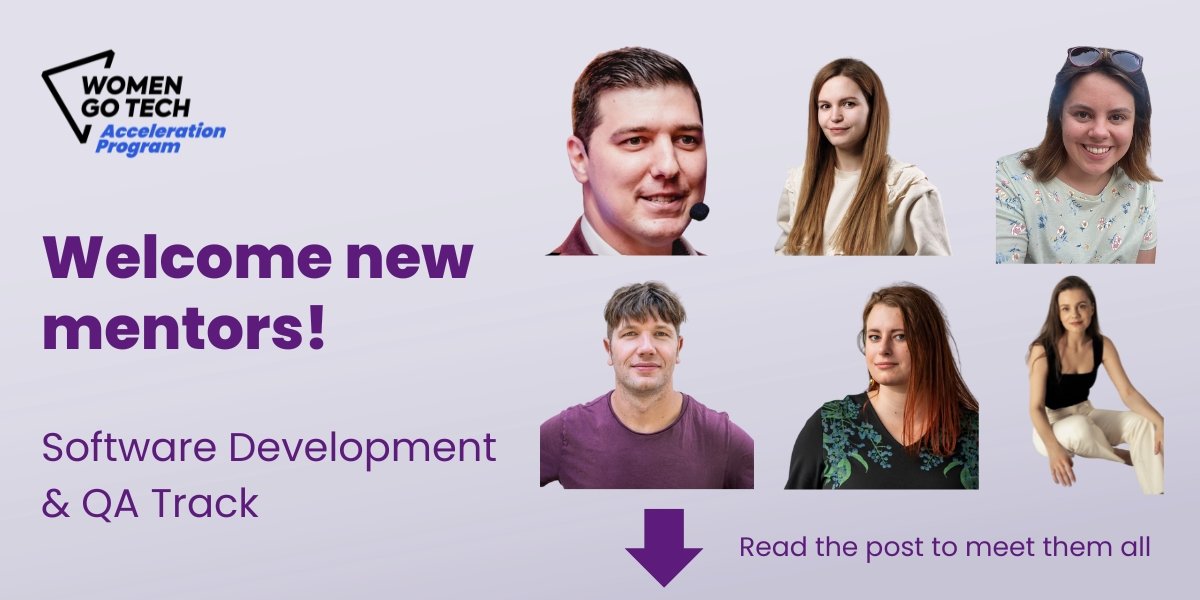
I’m excited to warmly welcome our newest mentors joining the upcoming Software Development & QA cohort of the Acceleration Program. Their commitment to join us marks a significant step toward […]

I’m excited to warmly welcome our newest mentors joining the upcoming Software Development & QA cohort of the Acceleration Program. Their commitment to join us marks a significant step toward empowering aspiring women in tech, enhancing diversity, and catalyzing positive change in the industry.
As we gear up for this new cohort, it’s important to recognize the growing demand for skilled professionals in Front-end and Back-end development, and Quality Assurance.
Our mentors come equipped with extensive knowledge and valuable experience. Over the next six months, they will impart this expertise to their mentees, guiding them through the complexities of tech careers and aiding them in securing their first professional roles.
The program will also provide ample opportunities for learning and growth for both mentors and mentees.
Together, we’ll delve into industry best practices and emerging trends, expand our networks, collaborate on exciting projects, understand what it takes to succeed in the current job market, and foster a supportive community where women can flourish in technology.
Ieva,
Accelertion Program manager
Meet the Mentors of Each Track
Looking to transition into tech? Apply to our Acceleration program.
-
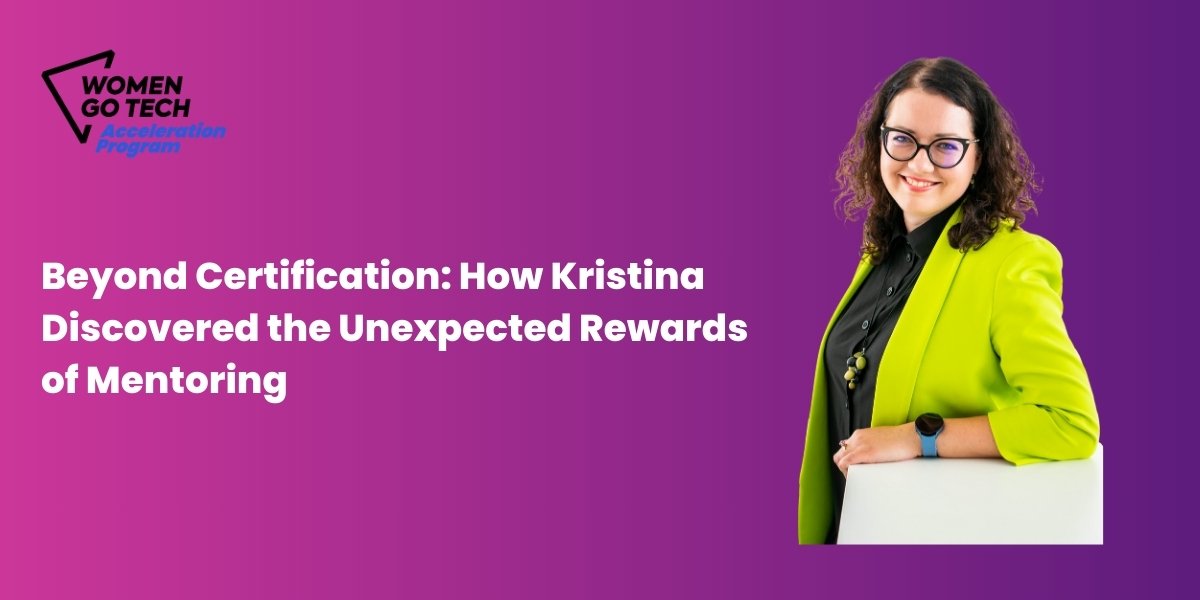
The tech industry thrives on innovation, but that spark often needs a guiding hand. Mentors like Kristina Šuklevičienė, Project Team Manager at Intrum and a 2023 UX/UI Design mentor with […]
The tech industry thrives on innovation, but that spark often needs a guiding hand. Mentors like Kristina Šuklevičienė, Project Team Manager at Intrum and a 2023 UX/UI Design mentor with Women Go Tech, play a crucial role in shaping the future. Kristina’s mentoring story isn’t just about her journey—it’s a testament to the transformative power of mentorship for both mentor and mentee.

Overcoming Self-Doubt to Embrace Mentorship
Kristina was initially hesitant about becoming a mentor. This hesitation stemmed from a lack of formal certifications despite her decade of experience in IT projects.
However, Women Go Tech, and a supportive colleague encouraged her to share her knowledge.
“I felt a responsibility to contribute to the growth of aspiring women in IT,” Kristina reflects, highlighting the value of real-world experience over formal qualifications. This sentiment resonates with many experienced professionals who might undervalue their practical knowledge.
Unexpected Rewards of Mentorship
Through mentorship, Kristina discovered three key takeaways:
- Mutual Learning: “It not only benefited my mentee but also reinforced my own understanding,” she shares, emphasizing the power of knowledge exchange. Mentorship is a two-way street where both parties learn and grow.
- The Power of Curiosity: Kristina underscores the importance of curiosity, which led her and her mentee to explore topics outside their initial scope. “Embracing curiosity became a key element in our mentorship,” she states. A curious mindset fosters deeper learning and discovery.
- Lifelong Learning: The experience solidified Kristina’s belief in continuous learning and adaptation, a crucial skill in today’s fast-paced tech industry.
The Journey, not the Destination
Kristina describes her favorite mentorship moment as the entire Journey, not a specific event. “The joy I felt seeing my mentee confidently declare her goal to become an IT project manager showcased the impact a mentor can have,” she reflects. Mentorship fosters growth and empowers mentees to pursue their ambitions.
Mentorship Essentials: Openness and Curiosity
For aspiring mentors, Kristina offers this advice: “Be open and stay curious together with your mentee.” Mentorship isn’t about having all the answers; it’s about co-exploration and growth.
Kristina shares a success story—a mentee who started applying insights from their sessions to her current job. “Her confidence in using project management methods is promising. She’s already a true project manager,” Kristina observes. Mentorship translates to practical skills and empowers mentees to excel in their careers.
Kristina’s experience exemplifies the profound influence mentorship has on women in tech. It’s a collaborative journey of growth, challenges, and victories, built on the belief that everyone has something valuable to share and new horizons to discover together.
Take on the challenge of helping women transition to tech and grow professionally and personally. Become a mentor.
-
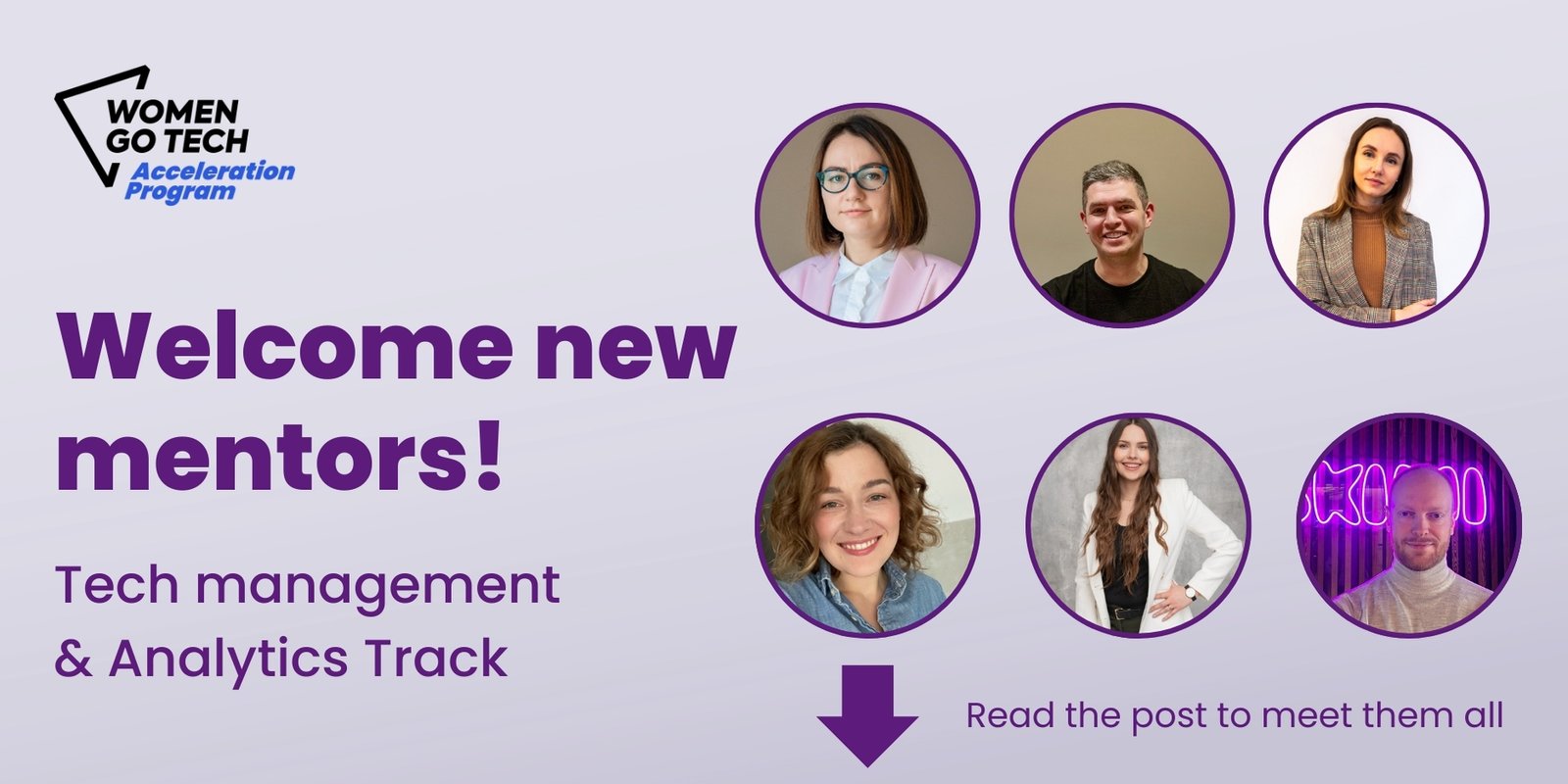
I am thrilled to extend a warm welcome to our new mentors for the upcoming Tech Management & Analytics cohort of the Acceleration Program. Their decision to join us on […]
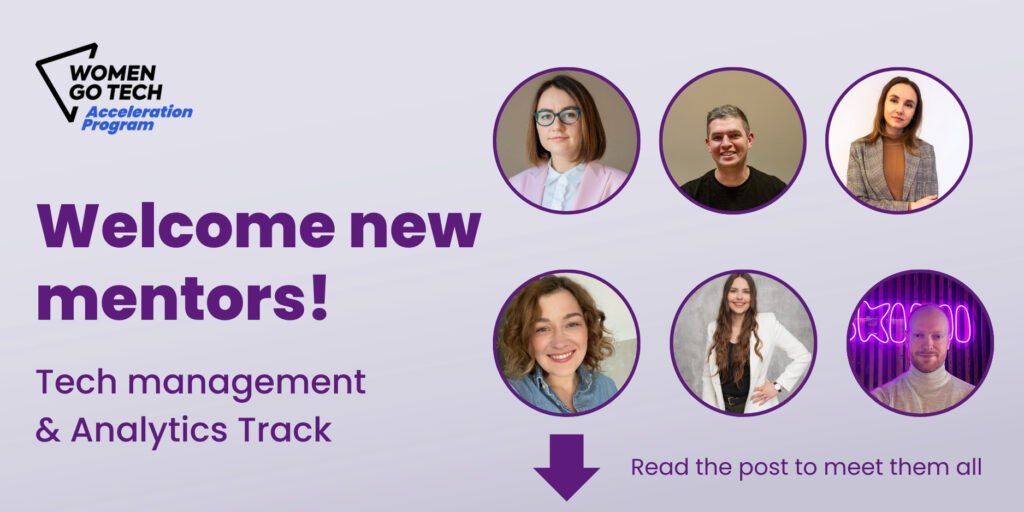
I am thrilled to extend a warm welcome to our new mentors for the upcoming Tech Management & Analytics cohort of the Acceleration Program. Their decision to join us on this journey signifies a deep commitment to empowering aspiring women in tech, fostering diversity, and driving positive change within the tech industry.
As we prepare to kick off this exciting new cohort, it’s crucial to acknowledge the significant need for skilled professionals in IT Project Management, Product Ownership, and Data Analytics fields.
Recent industry reports underscore the growing demand for expertise in these areas, as organizations across sectors increasingly rely on technology-driven solutions to innovate and enhance operational efficiency.
Our new mentors bring a wealth of knowledge and valuable experience to the table. During the 6-month journey in the program, they will share this knowledge with their mentees and play a key role in guiding them through the ins and outs of tech careers, ultimately helping them secure their first positions.
In addition to mentorship, the program will include numerous opportunities for learning and development for both mentors and mentees.
Together, we will explore and discuss industry best practices and new trends, network, collaborate on exciting projects, learn what it takes to succeed in today’s job market and build a supportive community where women can thrive in tech.
Ieva,
Accelertion Program manager
Meet the Mentors of Each Track
Looking to transition into tech? Apply to our Acceleration program.
-

Kostas Mackevičius. Head of QA. Hostinger
-

Margarita Grigalevičiūtė. Data Analyst. Macaw
-

Arvydas Maciulevičius. Head of Technical Service Automation. HELLA Lithuania
-

Rūta Laurikaitytė-Franckevičė. Test Automation Engineer. IBM
-

Dominyka Ragauskaitė. Product Management Lead. Vinted
-

Lina Praškevičiūtė. Leading Product Manager .Vinted
-

Ffion Quick. UX Writer. Wix
-

Andrius Binevičius. Process technology specialist. HELLA
-

Birutė Kiričiuk. Principal Test Engineer. TransUnion
-

Wailana Kalama. Content Designer. Wix
-

Marija Padvilike. Senior System Analyst. EIS Group Lietuva
